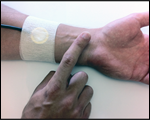Current funding:
- Site Director & co-Principal Investigator: d-real SFI Research Centre for Training in Digitally Enhanced Reality (2020-27)
- Funded Investigator: Insight Centre for Data Analytics, Science Foundation Ireland (2014-24)
- Funded Investigator: ADAPT Centre for AI Driven Digital Content, Science Foundation Ireland (2021-26)
- Co-Investigator: INTERACT, National Institute for Health Research (NIHR) UK (2016-24)
Past funding:
- Principal Investigator: TEAM ITN, EU H2020 Marie Skłodowska-Curie Actions (2016-21)
- Co-investigator: CATCH ITN, EU H2020 Marie Skłodowska-Curie Actions (2016-21)
- Co-investigator: ECME, EU INTERREG VA Programme (2017-22)
- Theme Leader: SPHERE Sensor Platform for Healthcare in Residential Environment. EPSRC, (2013-17).
- Principle investigator: Integrated support for adolescent mental health, NHS Health Ent. East (2014-15).
- Theme Leader: Integrative Epidemiology Unit. MRC (2013-17).
- Principal-investigator: UK Hydrographic Office Knowledge Transfer Partnership (2013-15).
- Co-investigator: GHOST: generic, highly-organic shape-changing interfaces. EU FET-Open (2013-15).
- Principle investigator: Games supporting adolescent mental health, NHS Health Enterprise East (2013-14).
- Co-investigator: Digital Green Doors, EPSRC Research in the Wild, EP/K012509/1 (2013-14).
- Personal Fellowship: Marie Curie Post-doc Fellowship. EU FP7 and IRCSET Inspire (2009-12).
Projects:
 |
TEAM ITN TEAM was a 4 year Innovation Training Network (ITN), funded by EU Horizon 2020 Marie Skłodowska-Curie actions. It provided PhD training in Digital Mental Health. I coordinated the overall network, which focused on developing new technologies to support the assessment, prevention and treatment of mental health difficulties in young people. |
 |
Online Help-Seeking for Mental Health Seeking help is often an important step in addressing mental health difficulties. Evidence suggests that positive help- seeking experiences contribute to an increased likelihood of future help-seeking and achieving improved outcomes. This project is exploring the design on online help seeking tools. [ CHI 2020 ] [ JMIR 2019 ] [ JMIR Mental Health 2019 ] |
 |
User Autonomy and the Sense of Agency This is an ongoing project in which we are applying implicit metrics – derived from recent research in Cognitive Neuroscience – to explore and map peoples’ experience of personal agency when interacting with new technologies, such as on-body and intelligent interfaces. [CHI 2012] [CHI 2015] [F. Human Neuroscience] [CHI 2018] |
 |
Pesky gNATs The Pesky gNATs software is designed for use by mental health professionals who work with young people with anxiety or low mood. It consists of a computer game and mobile app, together with online training for mental health professionals. Different versions are available for younger and older adolescents. [ Internet Interventions 2020 ] [JMIR Mental Health 2019] [JMIR 2019] |
 |
INTERACT Traditional approaches to psychotherapy emphasise face-to-face contact. In contrast, current computerised approaches tend to minimise this contact. INTERACT is exploring an alternative approach that integrates face-to-face contact, electronic contact, online collaboration, and support for between-session activities. [ CHI 2020 ] [JMIR 2018] [JMIR Mental Health 2019] |
 |
The ID Game Despite its evidence base in the general population, computerised cognitive behavioural therapy (CBT) has not previously been adapted for use with people with intellectual disability. This project explores a game-based intervention to support CBT for adults with an intellectual disability. [B J Psych 2017] [JARID 2018] [ Br J Learn Disabil 2021 ] |
 |
ECME – Cardiovascular Rehabilitation The Eastern Corridor Medical Engineering Centre (ECME) is a collaborative research project focusing on improving cardiovascular health. It is a partnership between 5 leading academic research centres and Southern Health & Social Care Trust. [JMIR 2020] [JMIR Cardio 2021] |
 |
Recommender Systems for Healthy Food Recommender Systems have the potential to support informed and healthy food choices. However, food choices are complex and driven by many factors. This project explores topic modelling and visualisation techniques in support of healthy food recommendations. [J Intell Inf Syst 2021] |
 |
CATCH CATCH is a 4 year Innovation Training Network (ITN), funded by the European Union’s Horizon 2020 programme under the Marie Skłodowska-Curie actions initiative. It focuses on the design and development of connected health technologies to support rehabilitation for cancer patients. [CATCH website] |
 |
Mindfulness – Present Moment Awareness Increased popularity of mindfulness practices, together with increased access to mobile technology, has led to many mindfulness apps becoming available, some specifically for children. This project explores children’s experience of mindfulness delivered both face-to-face and through a mobile app to highlight any differences or similarities. [B J Psych 2018] |
 |
Handaxe CIC Handaxe CIC is a not for profit company dedicated to research and development of technology to support adolescent mental health services. Pesky gNATs is our first product. It is a computer game and mobile app that support clinical interventions for young adolescents experiencing anxiety and depression. |
 |
Gamification and Cognitive Assessment Cognitive tasks are typically effortful and repetitive, which often leads to participant disengagement. This, in turn, may negatively impact data quality or reduce intervention effects. Gamification may provide a possible solution. If game design features can be incorporated into cognitive tasks without undermining their scientific value, then data quality, intervention effects, and participant engagement may be improved. [JMIR Serious Games 2016] [JMIR 2017] |
 |
SPHERE SPHERE (Sensor Platform for HEalthcare in a Residential Environment) is an EPSRC funded interdisciplinary research collaboration (IRC) led by the University of Bristol together with the Universities of Southampton and Reading. The project focuses on developing sensor systems to monitor the health and wellbeing in the home. [CHI 2016] [Pervasive Health 2015] [Personal and Ubi Comp 19(8)] [WPTC 2015] |
 |
Crowdsourcing and community activism Close the Door explored ways in which mobile crowdsourcing can be used to support pro-environmental community activists groups. In contrast to previous HCI research on pro-environmental technology, much of which is focused on individual behaviour change, this project offered new insights on the design of systems that target groups and communities. [CHI 2013] [CSCW 2014] |
 |
Interaction and Visualisation for Marine Navigation This is a research collaboration with the United Kingdom Hydrographic Office in which we are designing and prototyping visualisation tools and interaction techniques for complex, safety critical marine navigational data. |
 |
SilverCloud SilverCloud is an software platform that supports the rapid development of computer supported interventions for common mental health disorders. It aims to increase access to and engagement with treatment. To date the platform has been used to developed treatment programs for difficulties including depression, anxiety and eating disorders. [CHI 2012] |
 |
gNats Island gNats Island is a computer game that implements key aspects of Cognitive Behavioural Therapy (CBT). It implements CBT in a generalised manner and is intended for use with adolescents experiencing a range of difficulties, including depression and anxiety. It is designed to fully integrate with a six session, manualised, face-to-face intervention. [CHI 2011] |
| PlayWrite PlayWrite is a system which allows mental health care professionals to create and adapt therapeutic 3D computer games, which can then be used in adolescent mental health interventions. It supports the creation of games that implement a variety of theoretical approaches and target a variety of mental health difficulties. [CHI EA 2010] |
 |
Technology for Mental Health My PhD focused on the design on the design of technology to support mental health interventions. Alongside the development of computer games and game frameworks, this included research to develop design and evaluation guidelines for this area. [IwC 2010] [IwC 2007] |
 |
Personal Investigator Personal Investigator was a 3D computer game that implemented Solution Focused Therapy. It was designed specifically for use in adolescent mental health interventions and was a forerunner to other mental health games. In the game adolescents played an investigator hunting for the clues that could help them to solve a personal problem. [CHI 2009] [ITSE] |
 |
Savant Savant was a museum installation which explored the unusual audio and visual experiences of people with autism.This project won a 2003 Europrix Top Talent Award. |